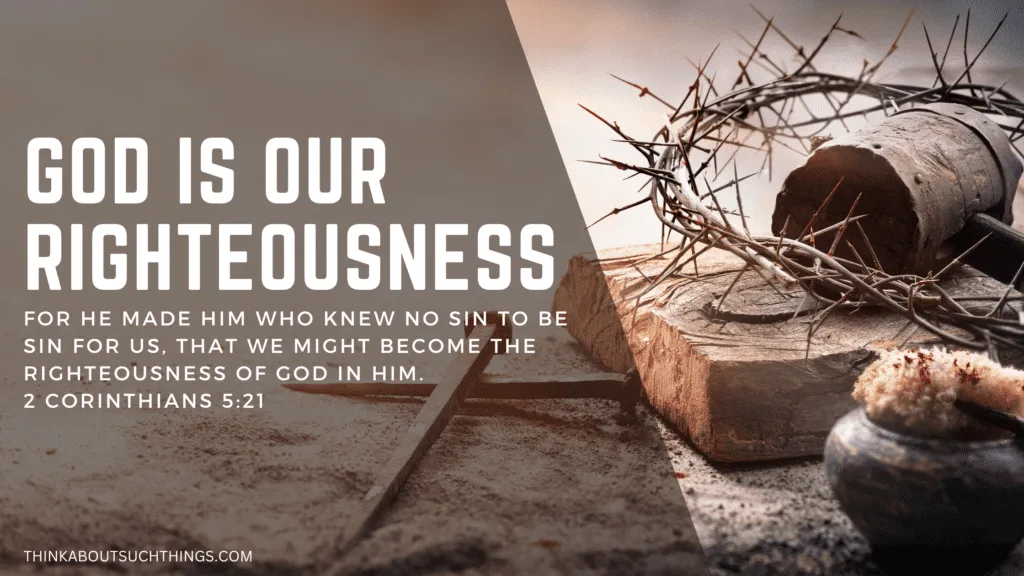In this article, we will have a Bible study on the name of God: Jehovah Tsidkenu. We will look at the meaning and how it pertains to us today. So, grab your Bible, and let’s dive in…
Our God is an infinite God, and sometimes His character and nature are difficult for us to comprehend with our human minds.
As we discover more about Him, we want to use words to describe Him, which leads to God has many names. We have covered Jehovah Shammah, and now we will be looking at Jehovah Tsidkenu. This is a name that is so deep, but what does this name mean, and what does it mean to us today?
Jehovah Tsidkenu is one of the names used to describe God in the Old Testament, but because our God is the same yesterday, today, and forever, this name is still relevant to His character today.

Still, it means something a little different to those living in the world after Christ has come as our savior. We will journey to discover this amazing name of our God, Jehova Tsidkenu, and wonder at His amazing love for His people.
What Does Jehovah Tsidkenu Mean?
It is difficult to put the Creator of the universe in a box and give him one name that describes His character and attributes, which is why we know Him by so many wonderous names.
Each time we learn more about God and His nature, we need to add to the names attributed to Him, and Jehovah Tsidkenu is one of those names. God uses His names to teach us about Himself, His nature, and His care for us, which is why the study of the names of God is important to Christians.
So, what does Jehova Tsidkenu mean?
This name of God is a combination of God’s Hebrew name, “Yahweh”, and the Hebrew word for righteousness, “tsidkenu.”
יְהֹוָה צִדְקֵנוּ Yᵉhôvâh tsidqênûw, ye-ho-vaw’ tsid-kay’-noo; from H3068 and H6664 with pronominal suffix; Jehovah (is) our right; Jehovah-Tsidkenu, a symbolical epithet of the Messiah and of Jerusalem:—the Lord our righteousness.
Jehova Tsidkenu means “God Is Our Righteousness,” which has connotations for how we relate to God and how He relates to us.
Where Is Jehova Tsidkenu Used In The Bible?
There are only two places in scripture where this name of God is mentioned, and both are found in the Old Testament in the book of Jeremiah.
Jeremiah uses the name Jehovah Tsidkenu in Chapter 23:5-6 and chapter 33:15-16, where he is prophesying about the coming Messiah, Jesus Christ.
“Behold (listen closely), the days are coming,” says the Lord, “When I will raise up for David a righteous Branch; And He will reign as King and act wisely And will do [those things that accomplish] justice and righteousness in the land. “In His days Judah will be saved, And Israel will dwell safely; Now this is His name by which He will be called; ‘The Lord Our Righteousness.’ - Jeremiah 23:5-6 AMP n those days and at that time I will cause a righteous Branch of David to spring forth; and He (the Messiah) shall execute justice and righteousness on the earth. 16 In those days Judah will be saved and [the people of] Jerusalem will live in safety; and this is the name by which she will be called: the Lord Our Righteousness (Justice).’ - Jeremiah 33:15-16 AMP
Jeremiah says that Jesus, the coming One, will be God Our Righteousness, or Jehovah Tsidkenu. Why is this important, and what doe it mean for God’s people?
To get an understanding of what this means for God’s people, we need to go back in time and visit the Garden where it all began and learn a little of what righteousness means.
We Were Once Righteous Before God
When God created Adam and his wife, Eve, they were perfect humans and had the privilege of perfect communion and relationship with God.
God is a Holy and Righteous God, and only those that are holy and righteous can stand or even survive in the face of his righteousness and glory.
For Adam and Eve to walk in the Garden of Eden with Him, they had to be righteous, but what does righteousness mean? Righteousness essentially means to be “in right-standing with God,” implying blameless, free of sin, innocent, and pure.
Unfortunately, we lost our righteousness when Adam and Eve sinned in the Garden and chose to disobey God and go their own way.
Nobody since Adam and Eve has any righteousness on their own that will allow them to approach God, stand in his presence, and look upon His face.
The apostle Paul writes in Romans 3:10-23 that none are righteous, no, not one. We have all sinned, and we continually fall short of the glory of God.
Jehovah Tsidkenu Of The Old Testament

When God chose Israel to be His people, he needed a way for the people to enjoy a relationship with Him without being destroyed by His glory and holiness.
God instituted the presentation of blood sacrifice as an atonement for sin and covered our sins, making us righteous before God for a time so that the priests could enter the presence of the Lord.
The sacrifice had to be innocent and blameless, or “righteous,” to be a valid sacrifice to cover the sin of Israel (mankind) and allow us access to the immediate presence of the Lord.
In the Old Testament times, this opportunity was not available to everyone but only to the priests who entered the Holy of Holies where the glory of God’s presence lived among unrighteous humans.
However, this situation was not ideal, and our loving Father God wanted us to be restored permanently, so everyone could have the relationship with Him that Adam and Eve enjoyed in the Garden of Eden.
The Old Testament Law of Moses was given as a mirror to show mankind that we can never match up to God’s standard of righteousness. This is because we cannot obey every law through our own efforts and regain our right standing with God to allow us to enjoy His presence.
The apostle Paul says our efforts at righteousness are “as filthy rags” in comparison to God’s righteousness. So how could humans ever regain righteousness and once again enter into a relationship with God on a personal level?
This is where God’s name Jehovah Tsidkenu comes in, rescues us, and changes our situation to one of right standing with Him.
Jehovah Tsidkenu – God Is Our Righteousness

God knew that we could not gain a righteous status before Him by our own efforts and that without intervention, we would be lost and unable to be reunited with Him.
For this reason, the prophet Jeremiah uses the name Jehovah Tsidkenu in reference to the coming Messiah, Jesus Christ.
Since there is no righteous person on earth, we needed a righteous Savior who would become “righteousness” for us, and this was God himself in the form of His Son. Jesus is Jehova Tsidkenu, God our righteousness, because he became the once-and-for-all sacrifice that presents us as righteous before God the Father.
How Does God Become Our Righteousness?
The plan that God put into action before the foundation of the world was for His Son to be the ultimate sacrificial lamb, holy, blameless, and righteous, to take away the world’s sins.
When Jesus paid the price for our sins, he restored humans to a right standing with God by becoming our righteousness.
For this reason, the temple veil that separated people from God’s presence in the Holy of Holies was torn in two by God the moment Jesus died on the cross.
What does this mean for us? God tore the veil because, through Christ’s sacrifice, we now have free access to the presence of the Lord, not because of our righteousness, but because of His righteousness.
The wonderful news is that now God the Father views us through the righteousness of His Son, not our own “filthy rags” of righteousness, which could never stand up to God’s holiness!
Jesus has made it possible for humankind to once again have a face-to-face relationship with God because the Father does not see our righteousness when we approach His throne, but He sees the righteousness of His Son. Jesus has become Jehovah Tsidkenu, the Lord our righteousness!
As you can see, the names of God are a way He reveals His character and His love to us and His desire to restore us to a relationship with Him.
Our mortal minds are incapable of fathoming the depths of God’s character and love, so when he is called by a particular name in the Bible, we should pay attention and dig a little into what God is revealing to us through the His various names in the scriptures.
Bible Study Series On The Names of God
Are you curious about God’s many names? If so, I’m so excited to let you know that I have recently been working on a series all dedicated to exploring the names of God! Each one of His captivating titles shapes our understanding and interpretation of God.
So if you would like to deepen your knowledge and grow in your love and appreciation for His wonderful names, please don’t miss out on reading my articles below!
The Names of God
Jehovah Tsidkenu is a revelation that Jesus has done all for us, and when he said, “it is finished,” there is nothing more for us to do to be found worthy to approach the God of creation! Our heavenly Father sees us through the righteousness of His perfect, sinless Son!
Who can be found more worthy to enter the presence of the Father than the Son? We are privileged to approach God’s throne because Jesus paid the price. Take God up on His free gift, and you can also boldly approach the throne of grace and find salvation and a relationship with your God!

Melissa is a passionate minister, speaker and an ongoing learner of the Bible. She has been involved in church and vocational ministry for over 18 years. And is the founder of Think About Such Things. She has the heart to equip the saints by helping them get into the Word of God and fall more in love with Jesus. She also enjoys family, cooking, and reading.
She has spoken in churches in California, Oregon, Texas, and Mexico and has been featured in Guidepost Magazine and All Recipes Magazine. Read More…











